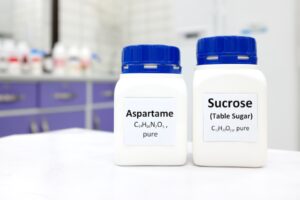Aspartame and Cancer
Hello Everyone! If you follow Eat Burn Sleep, this won’t be the first time you have heard me say that the food industry and its marketing have much to answer for! Both affect our physical and mental health.
In the 1950s, artificial sweeteners were promoted for weight loss as an alternative to sugar, and everyone was buying into it. Many chemicals were approved for food use at this time. Interestingly, not long after was the onset of rising obesity and cancer.
Artificial sweeteners cause gut dysbiosis, whereby an imbalance of the bacteria essential for life occurs. Gut dysbiosis leads to chronic systemic inflammation and a dysregulated immune system. Obesity is a systemic chronic inflammatory condition. As are some cancers.
Linking aspartame with cancer starts with what happens in the gut, and despite what people are saying in the media, it is easy to consume a dangerous amount!
BBC World asked me to comment about it if you missed it! All my latest Instagram posts are at the bottom of the Home page here.
Why Do Artificial Sweeteners Exist?
Why Is It Easy to Consume a Dangerous Amount of Aspartame?
What Foods and Drinks Contain Aspartame?
Aspartame Causes Pathological Changes
Obesity and Cancer
How To Reduce Calories Without Chemicals

Why Do Artificial Sweeteners Exist?
Artificial sweeteners were initially discovered in 1879 by Constantin Fahlberg in Ira Remsen’s laboratory at John Hopkins University in Baltimore, USA.
The story goes that he wondered why his bread tasted so sweet and remembered that he hadn’t washed his hands after being in the laboratory all day long. He was working with the coal tar derivative benzoic sulfimide. He called this sweet chemical saccharin, and he and Remsen went on to develop it in Germany.
It was popular during the world wars due to the agricultural crisis and sugar shortage.

During the time of the rapidly developing fast-food and confectionary industry in the 1950s, this artificial sweetener was viewed as an excellent way to reduce calories. Many additives are approved without long-term health studies to back up their safety.
The late 50s/early 60s was also the onset of the increase in obesity and cancer.
Artificial sweeteners for low calories for weight loss coincide with obesity increase because artificial sweeteners cause gut dysbiosis. Gut dysbiosis causes chronic inflammation. Obesity and some cancers are caused by chronic inflammation.

Aggressive marketing of foods that contain additives, sweeteners, and colors that should not be for human consumption has been around for a long time. They all contribute to the rise in disease.
Artificial Sweeteners and The Link to Cancer
In the 60s, cyclamate came along to blend with saccharin to take away the bitter aftertaste. It was used to sweeten beverages in the food industry until 1970, when it was banned in the US with suspicions of it causing cancer.
In 1977, scientists discovered saccharin caused bladder cancer in rats, so it carried a cancer warning label. It took four years to be listed in the US National Toxicology Program’s Report on Carcinogens. Twenty-three years later, scientists discovered humans don’t metabolize saccharin like rats, so the cancer warning label was removed!

This was when aspartame debuted as an alternative to sugar. Again, marketed as a weight-loss product.
Two years later – approved for the large, lucrative market of soft drinks!
Aspartame was discovered in a similar way to saccharin. Scientist James Schlatter had obtained the chemical as part of some drug research and had licked his finger!
It is 200 times sweeter than sugar!
Yet, it’s not natural, doesn’t taste the same, and has no calories. It has been, and is continuing to be, used in thousands of products since.
Food safety experts have called for aspartame to be banned many times over the years.

Why Is It Easy to Consume a Dangerous Amount of Aspartame?
It’s easy to dismiss health warnings when you hear that exposure to one particular carcinogen does not necessarily mean getting cancer.
This is true because genetics, lifestyle, exposure to other environmental factors, and the quantity and duration of exposure all come into it, but they surround us. There are so many carcinogens in what we eat and drink!
I keep hearing that experts are saying, “It would be impossible to exceed the recommended maximum amount of aspartame because that would be the equivalent of drinking 12+ glasses of Diet Coke a day.”

Unfortunately, this message is harmful to good health because aspartame isn’t just in carbonated drinks.
People may think they are safe by avoiding Diet Coke. Aspartame is in so many things! See the list below.
Aspartame rapidly hydrolyzes in your body, and absorbed in the gastrointestinal tract, and transforms into toxic metabolites before making lots of changes in the body, according to studies.
The intestinal microbial community and immunity are affected, and DNA, liver, enzymatic changes, levels of cysteine, metabolism, growth, disease, and mental well-being!
Let’s bear in mind we are only talking about one dietary carcinogenic here, too! There are so many additives that are capable of causing cancer. Not to mention that there are cancer promoters, too, that accelerate the growth of cancer!
Check the Red Food List, Members.
The European Journal of Oncology states half the amount (20mg per kg of body weight) of the recommended maximum amount of aspartame consumed links it to cancer.

Aspartame is used to improve taste, color, and texture and extend the shelf life of over 6000 products (and counting) without adding calories. Many food products and beverages contain it.
The compound is also in 500 pharmaceutical products because it is cheap and readily available. I have even seen it in ‘healthy’ foods.
So, it is easy to consume a large amount of aspartame in one day!
What Foods and Drinks Contain Aspartame?
Aspartame is in many ultra-processed products and include:
-
- *Sugar alternative sweeteners in little packets and dispensers
- *Carbonated drinks like Diet Coke, Coke Zero, Diet Pepsi, Pepsi Max, Sprite Zero, Diet Mountain Dew, Fanta Zero, and other ‘Diet’ and ‘Zero’ drinks
- *Most ‘sugar-free’ products
- *’Zero sugar’ teas and juices
- *’Low sugar’ products
- *’Diet’ products
- *’Low calorie’ products
- *’Fat-free’ products
- *Soft powdered drinks like milkshakes and hot chocolate
- *Chewing gum
- *Types of candy/sweets
- *Many ready-made desserts
- *All kinds of dessert mixes
- *Many icecreams
- *Some vitamins and supplements
- *Many workout supplements
- *Various medication
- *Some cough syrups and drops
For context purposes, a can of Diet Coke contains an estimated 200mg of aspartame!

Aspartame Causes Pathological Changes
Just this year, The World Health Organization (WHO) released a guideline on non-sugar sweeteners (NSS), stating that NSS had no value to a diet and was linked with diseases and mortality. They advised not to use them to control body weight.
Dr. Soffritti et al. have performed many studies on aspartame over the last decade and monitored the subjects throughout their entire lifetime. All with evidence of cancer-related aspartame and have stated:
• ‘Recent results of life-span carcinogenicity bioassays on rats and mice published in peer-reviewed journals, and a prospective epidemiological study, provide consistent evidence of aspartame’s carcinogenic potential.’
• ‘Our study shows that aspartame is a multi-potential carcinogenic compound whose carcinogenic effects are evident even at a low dose of 20mg/kg bodyweight.’
• ‘When life-span exposure to aspartame begins during fetal life, carcinogenic effects increase.’

Aspartame Increases Pathogenic Gut Bacteria
In many studies, a significant difference in gut microbial diversity occurs following the consumption of artificial sweeteners. Even ones FDA-approved!
Chichger & Shil (2021) showed in their study that sweeteners increase the ability of bacteria to form biofilms (3D structures that act as a microbial battlefront). They increase the adhesion and invasion of bacteria into human gut cells. This leads to our gut bacteria invading and causing damage to our intestines, linked to infection, sepsis, and multi-organ failure.
Pathogenic gut bacteria produced by aspartame can escape into the bloodstream via a leaky gut, triggering inflammation.

Suez et al. (2015) showed the results of a human study on 4-day food intake. It showed the relationship between aspartame and microbiota and demonstrated the increase in the abundance of Enterobacteriaceae and Clostridium leptum. These are both pathogenic and inflammation-inducing. Suez et al. (2015).
Obesity and Cancer
Systemic inflammation is a contributing factor in cancer.
As a matter of fact, the risk of developing cancer in chronic inflammatory conditions like obesity also demonstrates the relationship between cancer and inflammation.
It could also be the link to why more early-onset cancers that affect the digestive system are rising!
Advancing age was always the most critical risk factor for some cancers, but with more and more children with obesity, it means that the risk of developing cancer now happens earlier than it did before.

The food industry really has a lot to answer for!
Shuji Ogino, a professor of pathology at Harvard T.H. Chan School of Public Health, stated, “Many cancers involve the digestive system, which points to a big role for diet and the bacteria that live in our gut called the microbiome. I think this is an important piece because what it’s pointing to is changing exposure prevalences at early ages that are producing earlier-onset cancers.”
Being overweight links to cancers not related to the digestive system, too.
You may be interested in my BBC World interview: Does Junk Food Damage Your Body?
How To Reduce Calories Without Chemicals
Reducing calories through low-calorie, diet, zero, sugar-free, fat-free, 0%, etc., leads to inflammation. That means obesity, cancer, thyroid issues, alopecia, fertility issues, joint problems, brain fog, anxiety, depression, skin and body hair issues, and a whole array of other conditions.
I advise that you ignore these drinks and foods and ditch the calorie counting, skipping meals, fasting, yo-yo dieting, and constantly feeling hungry and unhappy! As I mentioned, you won’t avoid weight gain. Rather, you are encouraging it in the long term.
Life is to be lived. Food is to be enjoyed. A happy, healthy body is not hungry.
A happy, healthy mind and body have a good intestinal microbial community that protects the body from disease and reduces weight naturally without risk.

If you want to avoid chemicals in food and protect yourself and your family from cancer, obesity, and other chronic inflammatory conditions, join us on a Standard Membership.
Enjoy chemical-free drinks like Sugar-free Lemonade and Moroccan Spiced Coffee.
Eat and live the Eat Burn Sleep way. It works for busy people and for non-cooks, too! We focus on reducing inflammation and looking after our intestinal microbes.
Intestinal microbial communities play a significant role in health and disease; they change by what we eat, drink, and do every day, for better or worse.
What are you eating and drinking today?
Whatever you do, I hope that your day is lovely!


